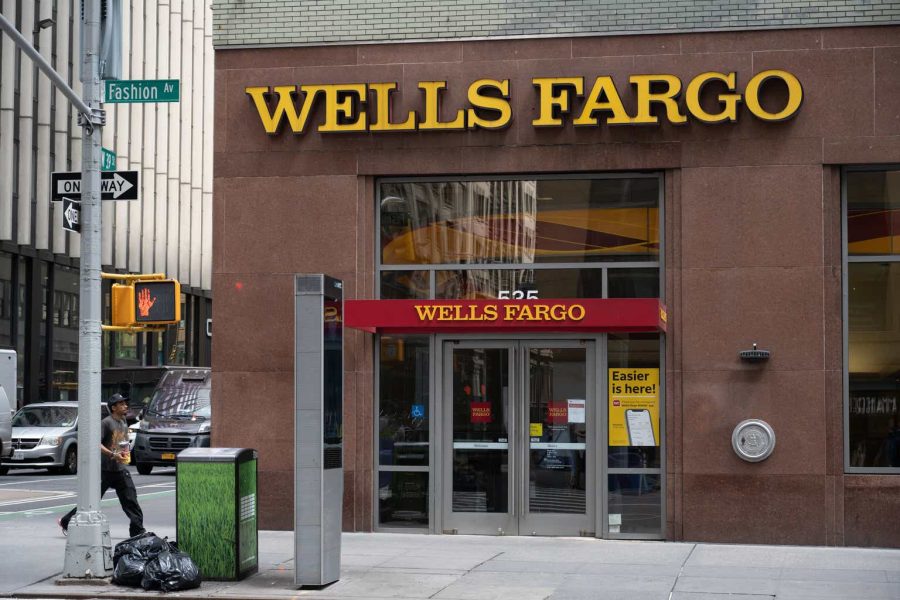July 14, 2024 This Week Top S&P 500 Gainers & Losers
Tesla Q2: The Bottom Is Likely In
Tesla: Time To Take Profits
Microsoft: The Q4 Results Should Surprise You
Tesla: Optimus And FSD Probably Won’t Save The Day
April 23, 2024 Maximizing Profits: When is the Right Time to Sell Your Business?
April 12, 2024 Improve Your Financial Status: A How-To Guide
April 12, 2024 How ZIM Integrated Container Tracking is Revolutionizing Global Trade
March 15, 2024 6 Best Growth Stocks To Buy Now According to Metatrader 5

Wells Fargo (WFC) Stock Forecast for 2024–2028. Sell or Buy?
Updated: July 27, 2024 (04:24)
Sector: FinancialThe share price of Wells Fargo & Company (WFC) now
50/200 Day Moving Average: $59.3 / $52.43
This figure corresponds to the Average Price over the previous 50/200 days. For Wells Fargo stocks, the 50-day moving average is the support level today.
For Wells Fargo stocks, the 200-day moving average is the support level today.
Are you interested in Wells Fargo & Company stocks and want to buy them, or are they already in your portfolio? If yes, then on this page you will find useful information about the dynamics of the Wells Fargo stock price in 2024, 2025, 2026, 2027, 2028. How much will one Wells Fargo share be worth in 2024 - 2028?
When should I take profit in Wells Fargo stock? When should I record a loss on Wells Fargo stock? What are analysts' forecasts for Wells Fargo stock? What is the future of Wells Fargo stock? We forecast Wells Fargo stock performance using neural networks based on historical data on Wells Fargo stocks. Also, when forecasting, technical analysis tools are used, world geopolitical and news factors are taken into account.
Wells Fargo stock prediction results are shown below and presented in the form of graphs, tables and text information, divided into time intervals. (Next month, 2024, 2025, 2026, 2027 and 2028) The final quotes of the instrument at the close of the previous trading day are a signal to adjust the forecasts for Wells Fargo shares. This happens once a day.
Historical and forecast chart of Wells Fargo stock
The chart below shows the historical price of Wells Fargo stock and a prediction chart for the next month. For convenience, prices are divided by color. Forecast prices include: Optimistic Forecast, Pessimistic Forecast, and Weighted Average Best Forecast. Detailed values for the Wells Fargo stock price can be found in the table below.
Long-term forecasts by years.

WFC Stock Forecast: Navigating Net Interest Income Decline and Fed Rate Cuts

Wells Fargo's (WFC) stock price faces numerous influencing factors in the near future. Most significantly, the anticipated decline in net interest income (NII) poses a direct threat to profitability. The bank missed NII expectations for Q2 2024 and projects an 8-9% annual drop due to higher funding costs and customers flocking to higher-yielding investments. This decline caps income growth potential, adversely affecting stock valuation.
Key Influencing Factors for WFC Stock Price
Another major factor is the Federal Reserve's potential rate cuts. Lower interest rates typically reduce the spread banks earn on loans and deposits, further squeezing Wells Fargo’s margins. Analysts must consider these possible rate cuts, which could intensify the projected NII decline, making it challenging for the bank to maintain earnings growth.
In addition, Wells Fargo's exposure to commercial real estate (CRE) is a critical aspect. Rising allowances for credit losses on office loans, particularly in an uncertain economic environment, could significantly impact the bank's balance sheet and investor sentiment.
However, WFC offers some upside potential through its robust investment banking performance, which showed a spectacular 70% year-over-year increase in fees. Although positive, this growth may not entirely offset the weak NII outlook.
Analysts forecasting WFC stock price should prioritize these factors:
- Net Interest Income (NII) Decline: Most impactful on profitability and stock valuation.
- Federal Reserve’s Rate Decisions: Lower rates could pressure margins and earnings growth.
- Commercial Real Estate Exposure: Adds risk and uncertainty to financial stability.
- Investment Banking Strength: Provides a buffer against NII declines.
- Balance Sheet Quality: Reflects sound risk management but has limited impact on stock price.
By closely monitoring these elements, analysts can generate accurate WFC stock price predictions. Investors should keep a keen eye on these developments to make informed buy or sell decisions regarding Wells Fargo stock.
Review the original Analysis


The recent analysis of Wells Fargo (WFC) stock suggests several key events and factors will significantly influence its stock rate in the near future. Understanding and accurately predicting these influences is crucial for analysts and investors alike.
Key Factors Impacting WFC Stock Price
- Monetary Policy and Interest Rate Cuts: Anticipated interest rate cuts by the Federal Reserve are expected to lower funding costs for Wells Fargo. This can lead to an increase in loan demand, thereby expanding the bank’s net interest income (NII).
- Net Interest Income (NII) Trends: After several quarters of decline, the slowdown in NII drops hints at stabilization, which can restore investor confidence and positively affect WFC stock price.
- Deposit Costs and Net Interest Margin (NIM): With deposit costs showing signs of stabilization, the compression in net interest margin may halt, potentially improving future profit margins for Wells Fargo.
- Non-Interest Income Growth: Significant growth in non-interest income streams, such as investment banking fees, offer resilience against fluctuations in NII, making Wells Fargo a more attractive investment.
- Loan and Deposit Trends: Resuming growth in deposit balances and stable loan declines can reinforce revenue stability, positing Wells Fargo as financially adaptable.
- Provision for Credit Losses: Fluctuations in provisions highlight future loan performance expectations. Stabilized provisions could indicate an improved economic outlook, reducing financial stress on the bank.
For analysts aiming to forecast Wells Fargo's stock price, these factors are indispensable. By monitoring changes in monetary policy, NII trends, and deposit costs, analysts can develop informed predictions. Observing non-interest income growth and loan-deposit trends further provides a comprehensive view of Wells Fargo’s financial health. In sum, these elements together help analysts determine whether Wells Fargo stock remains a good buy or sell option.
Review the original Analysis

Unlock the Future of Wells Fargo Stocks: Key Predictors & Insightful Tactics

As Wells Fargo strides into its second-quarter earnings for 2024, investors and analysts alike are on the edge of their seats, combing through every detail that could sway the WFC stock forecast. With an array of factors at play, understanding the nuances of Wells Fargo's financial landscape is crucial for anyone pondering whether WFC is a good stock to buy or if it's time to sell.
Peering Into Wells Fargo's Financial Crystal Ball
At the heart of the anticipation is the recent earnings results. Wells Fargo has managed to align with Wall Street's expectations previously, and a similar performance in the upcoming earnings could catalyze a positive shift in the WFC stock price prediction. Coupled with plans for a dividend increase of 14% and a new stock buyback program following a successful Federal Reserve's stress test, the stage is set for potential bullish behavior in the stock market.
Analysts equipped with a detailed WFC stock forecast will closely monitor the Second-Quarter Earnings Forecast, leveraging the revisions grade of B+ as a foundational component of their analysis. Moreover, with an emphasis on growth, profitability, momentum, and EPS revisions, Wells Fargo's stock grades reflect a compelling narrative for investors. Yet, they remain cautious due to the valuation concerns and looming risks of regulatory pressures and litigation that could shadow over the Wells Fargo stock forecast.
For analysts aiming to make the most accurate Wells Fargo stock predictions, sifting through these intricacies is more art than science. Balancing between optimism around the dividend increase, stock buyback plans, and the vigilant assessment of potential risks will dictate the direction of the WFC stock price target. Whether debating if it's the right time to buy or sell Wells Fargo stock, understanding these dynamics offers a glimpse into the possible future movements of WFC stock rates.
In a financial landscape that's always evolving, keeping a finger on the pulse of such consequential factors ensures investors and analysts alike can navigate the waves of uncertainty with a tad more confidence.
Review the original Analysis
Wells Fargo is an American bank. Works with individuals, small businesses, corporations and government agencies. Helps to manage accounts, assets and personal wealth. Wells Fargo has 8.6 thousand branches, 13 thousand ATMs and 40 million retail customers in the United States, Canada and Puerto Rico.
Wells Fargo is the fourth largest bank in the United States. It is included in the big four banks along with Bank of America, Citigroup and JPMorgan Chase. Ranked 7th in the list of the most expensive companies in the United States. In 2015, the company’s assets were worth $ 890.3 billion – Wells Fargo was ranked 19th in terms of assets among all investment companies in the world.
The company was founded in 1852. In the late 19th century, Wells Fargo helped companies move goods, provided loans, and serviced people’s accounts. In 1905, the company split into two parts: transport and banking. The shipping division has become one of the largest express delivery companies in the United States. In 1918, all such companies were nationalized – since then Wells Fargo has been operating as a bank.
Wells Fargo daily forecast for a month
| Date | Target | Pes. | Opt. | Vol., % |
|---|---|---|---|---|
| Jul 29 | 60.34 | 59.76 | 61.06 | 2.18 |
| Jul 30 | 60.36 | 59.99 | 61.18 | 1.99 |
| Jul 31 | 59.49 | 58.77 | 59.84 | 1.82 |
| Aug 01 | 60.02 | 59.78 | 60.34 | 0.94 |
| Aug 02 | 60.37 | 59.99 | 61.32 | 2.21 |
| Aug 03 | 60.79 | 60.31 | 61.55 | 2.06 |
| Aug 04 | 60.41 | 59.67 | 60.97 | 2.17 |
| Aug 05 | 60.71 | 59.92 | 61.08 | 1.93 |
| Aug 06 | 61.70 | 61.25 | 62.67 | 2.32 |
| Aug 07 | 61.38 | 60.48 | 61.88 | 2.31 |
| Aug 08 | 61.63 | 61.26 | 62.55 | 2.09 |
| Aug 09 | 61.26 | 60.90 | 62.10 | 1.97 |
| Aug 10 | 60.85 | 60.04 | 61.09 | 1.74 |
| Aug 11 | 61.94 | 61.61 | 62.88 | 2.07 |
| Aug 12 | 61.94 | 61.34 | 62.88 | 2.52 |
| Aug 13 | 61.79 | 60.92 | 62.50 | 2.60 |
| Aug 14 | 61.96 | 61.16 | 62.81 | 2.69 |
| Aug 15 | 62.36 | 61.68 | 62.78 | 1.78 |
| Aug 16 | 62.41 | 61.62 | 63.36 | 2.84 |
| Aug 17 | 61.25 | 60.35 | 62.21 | 3.09 |
| Aug 18 | 61.47 | 60.92 | 61.83 | 1.49 |
| Aug 19 | 61.40 | 60.54 | 62.36 | 3.00 |
| Aug 20 | 61.41 | 60.54 | 61.98 | 2.37 |
| Aug 21 | 62.51 | 61.69 | 62.83 | 1.84 |
| Aug 22 | 62.59 | 61.78 | 63.28 | 2.43 |
| Aug 23 | 63.72 | 62.98 | 64.25 | 2.02 |
| Aug 24 | 62.95 | 62.46 | 63.96 | 2.40 |
| Aug 25 | 62.94 | 62.10 | 63.63 | 2.47 |
| Aug 26 | 61.73 | 61.34 | 62.28 | 1.53 |
| Aug 27 | 61.89 | 61.25 | 62.70 | 2.36 |
Wells Fargo Daily Price Targets
Wells Fargo Stock Forecast 07-29-2024.
Forecast target price for 07-29-2024: $60.34.
Negative dynamics for Wells Fargo shares will prevail with possible volatility of 2.134%.
Pessimistic target level: 59.76
Optimistic target level: 61.06
Wells Fargo Stock Forecast 07-30-2024.
Forecast target price for 07-30-2024: $60.36.
Positive dynamics for Wells Fargo shares will prevail with possible volatility of 1.953%.
Pessimistic target level: 59.99
Optimistic target level: 61.18
Wells Fargo Stock Forecast 07-31-2024.
Forecast target price for 07-31-2024: $59.49.
Negative dynamics for Wells Fargo shares will prevail with possible volatility of 1.790%.
Pessimistic target level: 58.77
Optimistic target level: 59.84
Wells Fargo Stock Forecast 08-01-2024.
Forecast target price for 08-01-2024: $60.02.
Positive dynamics for Wells Fargo shares will prevail with possible volatility of 0.935%.
Pessimistic target level: 59.78
Optimistic target level: 60.34
Wells Fargo Stock Forecast 08-02-2024.
Forecast target price for 08-02-2024: $60.37.
Positive dynamics for Wells Fargo shares will prevail with possible volatility of 2.166%.
Pessimistic target level: 59.99
Optimistic target level: 61.32
Wells Fargo Stock Forecast 08-03-2024.
Forecast target price for 08-03-2024: $60.79.
Positive dynamics for Wells Fargo shares will prevail with possible volatility of 2.015%.
Pessimistic target level: 60.31
Optimistic target level: 61.55
WFC (WFC) Monthly Stock Prediction for 2024
| Month | Target | Pes. | Opt. | Vol., % |
|---|---|---|---|---|
| Aug. | 57.49 | 56.02 | 60.34 | 7.16 |
| Sep. | 57.90 | 56.79 | 59.06 | 3.84 |
| Oct. | 59.94 | 56.92 | 63.30 | 10.08 |
| Nov. | 61.81 | 59.49 | 62.95 | 5.50 |
| Dec. | 63.89 | 61.64 | 65.99 | 6.58 |
Wells Fargo forecast for this year
Wells Fargo Stock Prediction for Aug 2024
An downtrend is forecast for this month with an optimal target price of $57.4904. Pessimistic: $56.02. Optimistic: $60.34
Wells Fargo Stock Prediction for Sep 2024
An uptrend is forecast for this month with an optimal target price of $57.9043. Pessimistic: $56.79. Optimistic: $59.06
Wells Fargo Stock Prediction for Oct 2024
An uptrend is forecast for this month with an optimal target price of $59.9425. Pessimistic: $56.92. Optimistic: $63.30
Wells Fargo Stock Prediction for Nov 2024
An uptrend is forecast for this month with an optimal target price of $61.8127. Pessimistic: $59.49. Optimistic: $62.95
Wells Fargo Stock Prediction for Dec 2024
An uptrend is forecast for this month with an optimal target price of $63.8896. Pessimistic: $61.64. Optimistic: $65.99
Wells Fargo (WFC) Monthly Stock Prediction for 2025
| Month | Target | Pes. | Opt. | Vol., % |
|---|---|---|---|---|
| Jan | 68.34 | 65.44 | 72.60 | 9.86 |
| Feb | 68.39 | 64.56 | 70.47 | 8.39 |
| Mar | 70.03 | 68.69 | 72.33 | 5.03 |
| Apr | 69.92 | 67.96 | 74.23 | 8.44 |
| May | 72.61 | 71.27 | 74.41 | 4.22 |
| Jun | 71.04 | 67.80 | 74.28 | 8.72 |
| Jul | 69.62 | 66.55 | 71.18 | 6.49 |
| Aug | 71.29 | 69.41 | 72.48 | 4.25 |
| Sep | 76.31 | 73.25 | 79.97 | 8.40 |
| Oct | 77.89 | 76.02 | 82.38 | 7.72 |
| Nov | 83.69 | 78.47 | 88.31 | 11.14 |
| Dec | 85.16 | 81.01 | 87.20 | 7.11 |
Wells Fargo (WFC) Monthly Stock Prediction for 2026
| Month | Target | Pes. | Opt. | Vol., % |
|---|---|---|---|---|
| Jan | 84.41 | 80.63 | 87.11 | 7.44 |
| Feb | 83.40 | 80.13 | 88.54 | 9.50 |
| Mar | 82.93 | 81.41 | 85.39 | 4.66 |
| Apr | 78.02 | 73.28 | 79.77 | 8.14 |
| May | 74.90 | 71.55 | 77.36 | 7.51 |
| Jun | 71.25 | 69.25 | 74.67 | 7.25 |
| Jul | 68.91 | 65.99 | 72.22 | 8.63 |
| Aug | 74.20 | 71.47 | 75.80 | 5.72 |
| Sep | 71.23 | 67.81 | 72.60 | 6.59 |
| Oct | 73.11 | 70.42 | 75.45 | 6.67 |
| Nov | 71.07 | 69.53 | 72.83 | 4.53 |
| Dec | 65.67 | 64.51 | 67.87 | 4.95 |
Wells Fargo (WFC) Monthly Stock Prediction for 2027
| Month | Target | Pes. | Opt. | Vol., % |
|---|---|---|---|---|
| Jan | 64.25 | 62.76 | 66.92 | 6.22 |
| Feb | 59.62 | 58.67 | 63.01 | 6.89 |
| Mar | 62.10 | 59.02 | 63.39 | 6.90 |
| Apr | 59.87 | 57.95 | 62.26 | 6.92 |
| May | 61.02 | 58.72 | 62.28 | 5.72 |
| Jun | 61.99 | 60.06 | 64.97 | 7.56 |
| Jul | 65.17 | 61.36 | 66.68 | 7.97 |
| Aug | 68.03 | 64.93 | 70.16 | 7.45 |
| Sep | 73.20 | 71.04 | 77.77 | 8.66 |
| Oct | 74.49 | 72.82 | 76.46 | 4.75 |
| Nov | 71.69 | 67.27 | 76.05 | 11.54 |
| Dec | 70.20 | 66.21 | 73.34 | 9.72 |
Wells Fargo (WFC) Monthly Stock Prediction for 2028
| Month | Target | Pes. | Opt. | Vol., % |
|---|---|---|---|---|
| Jan | 67.56 | 63.89 | 69.40 | 7.94 |
| Feb | 68.59 | 65.95 | 72.76 | 9.35 |
| Mar | 68.04 | 65.64 | 70.16 | 6.44 |
| Apr | 71.30 | 68.85 | 72.96 | 5.63 |
| May | 74.44 | 72.89 | 75.75 | 3.77 |
| Jun | 72.06 | 68.20 | 75.40 | 9.56 |
| Jul | 69.75 | 68.19 | 71.76 | 4.98 |
| Aug | 71.54 | 68.05 | 73.77 | 7.76 |
| Sep | 74.97 | 71.43 | 79.65 | 10.32 |
| Oct | 79.65 | 76.91 | 82.58 | 6.87 |
| Nov | 79.01 | 74.59 | 82.49 | 9.58 |
| Dec | 76.04 | 73.61 | 77.99 | 5.62 |
Wells Fargo information and performance
420 MONTGOMERY STREET, SAN FRANCISCO, CA, US
Market capitalization of the Wells Fargo & Company is the total market value of all issued shares of a company. It is calculated by the formula multiplying the number of WFC shares in the company outstanding by the market price of one share.
EBITDA of Wells Fargo is earnings before interest, income tax and depreciation of assets.
P/E ratio (price to earnings) - shows the ratio between the price of a share and the company's profit
Price/earnings to growth
Dividend Per Share is a financial indicator equal to the ratio of the company's net profit available for distribution to the annual average of ordinary shares.
Dividend yield is a ratio that shows how much a company pays in dividends each year at the stock price.
EPS shows how much of the net profit is accounted for by the common share.
Trailing P/E depends on what has already been done. It uses the current share price and divides it by the total earnings per share for the last 12 months.
Forward P/E uses projections of future earnings instead of final numbers.
Enterprise Value (EV) /Revenue
The EV / EBITDA ratio shows the ratio of the cost (EV) to its profit before tax, interest and amortization (EBITDA).
Number of issued ordinary shares
Number of freely tradable shares
Shares Short Prior Month - the number of shares in short positions in the last month.
Wells Fargo (WFC) stock dividend
Wells Fargo last paid dividends on 08/09/2024. The next scheduled payment will be on 06/01/2024. The amount of dividends is $1.4 per share. If the date of the next dividend payment has not been updated, it means that the issuer has not yet announced the exact payment. As soon as information becomes available, we will immediately update the data. Bookmark our portal to stay updated.
Last Split Date: 01/01/1970
Splitting of shares is an increase in the number of securities of the issuing company circulating on the market due to a decrease in their value at constant capitalization.
For example, a 5: 1 ratio means that the value of one share will decrease 5 times, the total amount will increase 5 times. It is important to understand that this procedure does not change the capitalization of the company, as well as the total value of assets held in private hands.















































